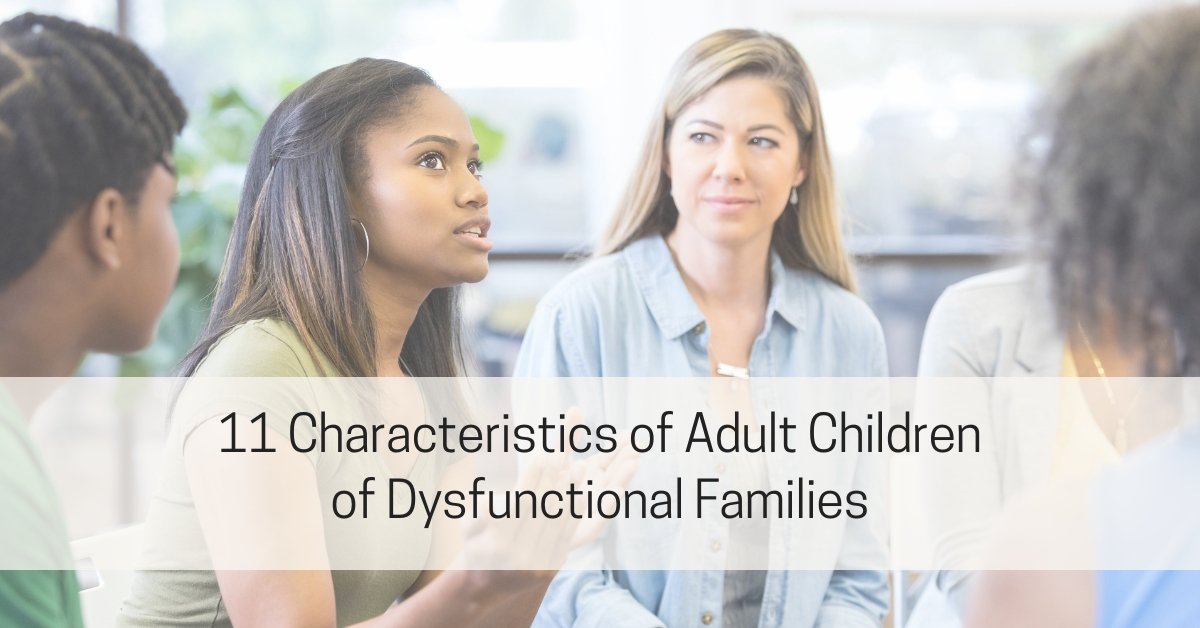Growing up in a dysfunctional family has a lasting impact on us.
Many adult children of dysfunctional families underestimate the effects of being raised in a dysfunctional family. Perhaps it’s wishful thinking. Perhaps it’s denial. More likely it’s shame and simply not knowing that adult children of dysfunctional families, as a group, tend to struggle with a particular set of characteristics or issues.
If you’re an adult child of a dysfunctional family (adult child), you may feel different and disconnected from others. You may wonder why you behave as you do, sometimes getting stuck in patterns that no longer serve you well. If this is the case, it can be a relief to realize that some of your struggles are common among adult children.
What Is a Dysfunctional Family?
A dysfunctional family is characterized by unhealthy patterns of communication, conflict, and behavior that negatively impact the well-being of its members. Dysfunctional families may have some of these problems:
- Abusive or emotionally immature parents.
- Parents who struggle with mental illness or abuse substances.
- Be chaotic and unpredictable.
- Have high levels of conflict and unresolved problems.
- Members have intense emotional outbursts (emotional dysregulation) or emotions are not expressed.
- Denial or ignoring problems.
- Enmeshment and unclear roles.
- Boundary problems (blurred, weak, or overly rigid boundaries).
- Be emotionally and/or physically unsafe.
- Lack of structure and rules or overly harsh and rigid rules.
- Lack of trust and respect among family members.
- Parentified children.
- Childhood emotional neglect.
- Codependency.
- Lying, manipulating, gaslighting, blaming or scapegoating.
The Effects of Growing Up in a Dysfunctional Family
If you grew up in a dysfunctional family, chances are it had a profound impact on you. Often, the full impact isn’t realized until many years later. The feelings, personality traits, and relationship patterns that you developed to cope with having an emotionally immature, toxic, abusive, or dysfunctional parent, come with you to work, romantic relationships, parenting, and friendships. They can show up as physical and mental health issues, relationship problems, such as codependency, and more.
The impact of growing up in a dysfunctional family will vary from one person to the next as no two families or adult children are the same. The following list is intended to give you a snapshot of issues commonly faced by adult children—even long after they’ve grown up and left home.
Common struggles and characteristics of adult children:
1. You’re rigid and controlling.
Because life felt out of control and unpredictable during childhood, you thrive on routine and predictability. Trying to control everyone and everything helps you feel safe.
You have a hard time with transitions and changes. A sudden change of plans or anything that feels out of your control can trigger feelings of anxiety, fear, overwhelm, or anger. Your relationships may suffer as others experience you as rigid or controlling and unwilling to change or compromise.
2. You have difficulty trusting others and are emotionally closed off.
When you’ve experienced developmental trauma, it’s natural to close yourself off as a form of self-protection. Your fundamental belief that others are trustworthy and safe was eroded by your parents; the people who are supposed to nurture and protect you let you down and hurt you. This makes it difficult to trust others—even in adulthood.
Growing up in a dysfunctional family taught you that it’s not safe to share your feelings, thoughts, hopes, or aspects of your identity. In your relationships with friends and partners, you hold back emotionally and will only reveal so much of your true self. This limits the amount of intimacy you can have with others and can leave you feeling disconnected from the people you love.
3. You feel shame and loneliness.
Shame is the feeling that you’re bad or flawed and unworthy of love. Dysfunctional families live in denial and refuse to acknowledge and address problems. Children can sense that something is wrong in a dysfunctional family and the denial and secrets lead them to blame themselves. For example, if your mother was incapacitated by chronic depression but your family never talked about her mental health, you may have felt responsible and thought her inability to nurture you was because you were difficult, needy, unlovable, or otherwise deficient.
Denial and secrets breed shame and loneliness. You were taught not to talk about problems or ask for help. And you may still feel ashamed of your family or yourself.
4. You’ve become a perfectionist.
As a child, you developed perfectionist tendencies to avoid criticism from others. As an adult, you continue to set impossibly high standards for yourself—and when you inevitably fail to live up to these perfectionistic ideals, you berate yourself.
Even your achievements aren’t satisfying; no matter what you accomplish, it’s never enough and you continually need to prove your worth by achieving more and more, often to exhaustion.
5. You criticize yourself constantly.
External messages that you’re inadequate, unacceptable, and unlovable become internalized over time, especially after hearing them for years. As a result, you’re incredibly hard on yourself and struggle to forgive and love yourself.
6. You feel overly responsible.
Out of necessity, you took on some of your parents’ responsibilities or became “parentified.” These may have been practical (like paying the bills) or emotional (like comforting your siblings when Mom and Dad fought) responsibilities. As an adult, you continue to take responsibility for other people’s feelings and problems.
7. You suffer from anxiety.
Adult children often have high levels of anxiety. Childhood fear and trauma left you in a hypervigilant state, constantly scanning for problems or danger. You’re on edge, tense, and full of worry. You may experience insomnia or ruminate about mistakes and things that might go wrong.
8. You’re a people-pleaser.
You have a strong need to be liked and accepted, often going above and beyond to make other people happy, usually at your own expense. This stems from experiencing rejection, blame, neglect or abuse, and a core feeling of being unlovable and flawed.
9. You’re empathetic and sensitive.
In my experience, adult children are caring and compassionate. Your pain has helped you cultivate empathy for others and to survive your dysfunctional family you became highly attuned to others’ emotional states. Empathy and compassion are assets, but people may take advantage of your kindness and tendency to self-sacrifice or overgive.
You may also be a highly sensitive person (HSP) who’s had to tamp down their emotions to cope. HSPs are extra sensitive to criticism and rejection. So, you people-please to try to avoid painful experiences such as these.
Your family of origin likely told you that being sensitive is a weakness and used your sensitivity to manipulate or hurt you. Being sensitive and empathetic are strengths you can learn to embrace and use more fully.
10. You avoid conflict at all costs.
Dysfunctional families can be chaotic and unpredictable. You had to walk on eggshells, trying to keep the peace and avoid a blow-up. Now, you go to great lengths to keep people happy and avoid disagreements. Conflicts are scary.
You never experienced healthy conflict resolution, so even a small disagreement or differing opinion can be anxiety-provoking, leading you to stay quiet rather than risk upsetting someone.
11. You’re reluctant to set boundaries.
No one modeled healthy boundaries for you as a child. You weren’t permitted to say no, have privacy, or express differing opinions. Now, you avoid setting and enforcing boundaries because you don’t know how to do so effectively, you feel guilty when you do, and you’re afraid of pushback or abandonment.
If you identify with this list of common characteristics of adult children, remember that you developed these coping strategies and traits to deal with your dysfunctional family. These responses are common and helped you survive. Understanding why you behave as you do can open the door for self-compassion and self-acceptance—both of which will aid healing and allow you to change behavioral patterns that no longer serve you.
Read more about recovering from a difficult childhood:
©2024 Dr. Sharon Martin, LCSW. All rights reserved. Photos courtesy of Canva.com.
This article has been adapted from one the author originally published on PsychCentral.com
Publisher: Source link






